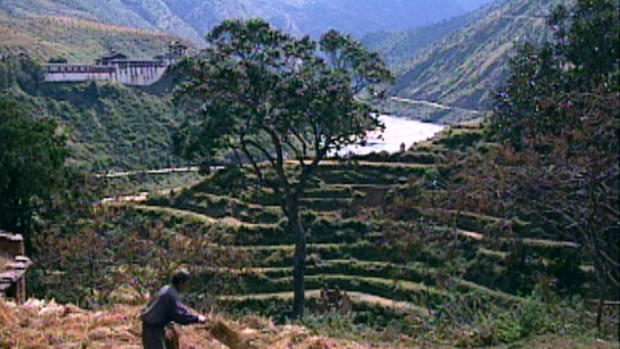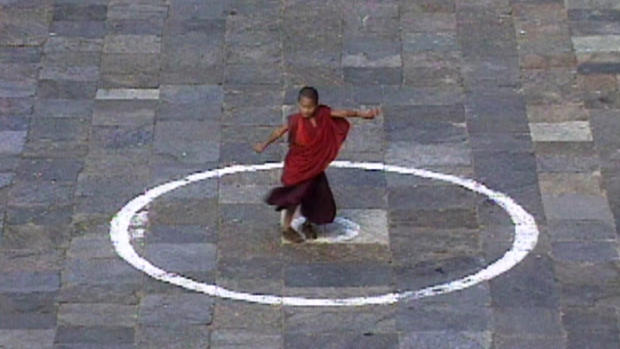When Morley Safer visited a "fairy-tale kingdom"
The following script is of "Gross National Happiness" which aired on February 6, 2000. Morley Safer was the correspondent.
While most governments are concerned with gross national product, we found a place, perhaps the only place on Earth, where the government's first priority is something it calls gross national happiness. The place is the tiny country of Bhutan, precariously tucked up in the Himalayas between the world's two most populous nations, China to the north and India to the south. You can fly to the land of gross national happiness only on Bhutan's national airline, a fleet of two small planes that maneuver through the clouds and high mountain passes, and only if the weather is just right. We went there to try to find out what gross national happiness is all about.
When you are here, you truly feel you are at the roof of the world. Everest is your neighbor; sacred mountains that isolate, but do not imprison. Monasteries cling to the brink, supported, it seems, by faith alone. For centuries, this peaceable Buddhist kingdom of 600,000 people has steadfastly held the outside world at bay, and even resisted perhaps the most powerful global intruder of all, fearful that it might destroy their unique identity. But now this most remote of places has decided to welcome that intruder into its midst.
We asked Bhutan's foreign minister, Jigme Thinley, why on earth bring television to Bhutan?
Jigme Thinley: We felt that time was ripe. The people were prepared. And also, isolated as we may be, the fact is that we feel the compulsions, we feel the compelling forces of globalization. We do not want to be marginalized. We want to be a part of that global village, while ensuring that we do not disappear in terms of our identity.
That identity is immediately apparent, a state of calm reflection. Time somehow loses its importance, a place where roads are only a recent phenomenon, where caution is politely asked for. In the capital, Thimphu, that civility makes traffic lights unnecessary. There are stray dogs galore, friendly beasts who lie around safe in the knowledge that in Bhutan they are next to man in the pecking, or scratching order, of creatures. Its mere existence in one of the world's toughest neighborhoods is itself a small miracle. China leans on it from the north, India to the south.
Jigme Thinley: We have survived for centuries. In fact, ever since recorded history, Bhutan has always been a sovereign independent country. With China, we have no difficulties of any kind. With India, we have excellent relations.
Morley Safer: All one of them has to do is cough, and Bhutan can catch pneumonia, correct?
Jigme Thinley: Yes, that is true. But we are hopeful and we are confident that if they do cough, they will not be facing Bhutan.
It's only in the last 30 years that Bhutan emerged from an almost medieval isolation to gingerly tastes of fruits of the 20th century. The chief of state is good King Jigme Singye Wangchuck, a monarch enlightened enough to not give interviews. He does give his subjects the power to remove him from the throne. He lives in a log cabin in the woods and leaves ceremonial duties to his four wives, all of whom are sisters. Day-to-day governance is left to a bunch of US college graduates, like the foreign minister.
Jigme Thinley: Penn State. Yes, I used to root for Nittany Lions.
Morley Safer: So you remain a good alumnus?
Jigme Thinley: Oh, yes. I follow the activities in my university very closely.
And others from Berkeley, Wisconsin and Tufts. They, like virtually everyone in Bhutan, adhere to a national dress code, making it difficult to distinguish between prince and pauper. Bhutan's austere form of Buddhism is also a constant reminder to all about the perils of power.
Jigme Thinley: Power and privilege definitely corrupt the soul.
Morley Safer: You would say that for yourself?
Jigme Thinley: Yes, I say that for myself, yes. I have to remind myself continuously.
The country is free of the more familiar kinds of public corruption: no fleets of Mercedes, no racks of Armanis, the hallmarks of Third World aristocracies. There's also no democracy, which Kinley Dorji, a Columbia University man and the editor of Bhutan's only paper, says is just fine.
Kinley Dorji: Why do we need to adopt democracy for the sake of democracy? What is important about democracy? And to us, it seems that the values are important, not the facade, not just electoral democracy. We have it all around us in Asia, and how much does it work?
Bhutan's system is like some fairy-tale kingdom in which there's an understanding, an unwritten social contract, that neither ruler nor ruled will violate.
Morley Safer: I get the feeling that you don't necessarily think that democracy, as we think of democracy, is necessarily the best thing for this country.
Jigme Thinley: Well, what is important to the people, basically, in a developing country? It's water, safe drinking water. It is good health, it is having a home, it is receiving education.
All of which the government, in its official plan, has reduced to a single phrase.
Jigme Thinley: Gross national happiness is, in fact, what this country is pursuing. It, in fact, is what every human being really pursues in life.
Kinley Dorji: Gross national happiness, to me, is a blend of economic development, of spiritual values, of a rich culture.
Gross national happiness: Any American politician or bureaucrat would be laughed off a platform trying to sell that one. But here it is quite simply the goal and purpose of responsible government. They hope to achieve it, they say, by carefully selecting what the West is doing right, but rejecting our cynicism and our consumerism, even when it comes to television. A case in point: The BBS, the Bhutan Broadcasting Service, created by the government to balance broadcasts that sneak in via satellite--the MTV beat, Larry King's chatter, all of the fun of the global fare. It makes the BBS chief, Sonam Tshong, one unhappy programmer when he must compete with the likes of "Baywatch."
Sonam Tshong: The example of "Baywatch," you see? You need people with perfect bodies and very beautiful people, and all kinds of things. So people like that kind of a thing. And when they look at our productions, they say, "Look, oh, yours is so rustic."
Rustic or not, for the few thousand Bhutanese with sets, the BBS is appointment television. Only problem is, it's often late for the appointment. So far, Mr. Tshong's programming consists of a half-hour of news a day--15 minutes in English, 15 in the native language of Dzongkha. But producers are pitching ideas for an increased schedule.
Sonam Tshong: Most of the producers are interested in a cultural drama kind of serials.
Morley Safer: Soap operas, we call them.
Sonam Tshong: Yes, with a Bhutanese touch.
Mr. Tshong says whatever he broadcasts serves a single purpose.
Sonam Tshong: I think the objective of our national television is not to make people buy things which they don't need. Our objective is to make people buy what they need, which is more knowledge, you know.
At the grassroots level, gross national happiness is in the hands of men like Pem Dorji, a regional governor whose domain is made up of small tradition-bound villages. He's considered a revolutionary.
Morley Safer: Are they sometimes a little bit resistant to change?
Pem Dorji: Yes, in the beginning, yes.
Such revolutionary luxuries as a brand-new stone path, such conveniences as freshly dug latrines, such newfangled ideas as moving animals out of the house.
Pem Dorji: The steps towards that ultimate goal of gross national happiness, yes, you can see all around. There is safe drinking water. There is electricity.
Most Bhutanese are subsistence farmers. They grow enough to feed themselves. Unlike nearby neighborhoods in the global village, there is no hunger. And there is universal primary education and health care. In just 20 years, life expectancy here has jumped 40 percent. These people are deeply religious, but without the fanaticism so common elsewhere. About one in 10 of the male population become monks. They practice and preach a brand of Buddhism that respects, above all, the natural world.
Kinley Dorji: Because of that, man and nature have developed a very close harmony over the years.
Morley Safer: I gather it's a crime to chop down a tree, a living tree.
Kinley Dorji: Yes.
Bhutan's biggest cash crop is the cleanest a country can own: fast-flowing waterways producing hydroelectric power, most of which is exported to India. But Bhutan has turned down lucrative lumbering operations and made millions of acres of its best timberland into a national park. And though it has the world's highest unconquered peaks, it banned mountaineering.
Kinley Dorji: The herdsmen who lived on the base of these mountains, who grazed their yaks on the base of those mountains, immediately petitioned the government, saying that--`What's going on? This--these mountains are sacred.' And the government considered that and decided very consciously that the sentiments of these people was more important than the profits of tourism.
In all, only 6,000 tourists are allowed to enter the country each year, and they are charged a steep price for the privilege.
Jigme Thinley: We follow a policy of high-value, low-volume tourism. And it has served us well.
Morley Safer: In essence, it's tourism for the rich?
Jigme Thinley: Let us say, it is tourism for the rich and the culturally sensitive people.
You let the ordinary environment dissolve, sitting in a hotel room in Bhutan...
Like these culturally sensitive Americans who've come to Bhutan seeking Buddhist enlightenment...
...trying to think about the meaning of life, something deeper...
...or these equally sensitive American bird watchers, who may look like an invasion force from L.L. Bean, but are exactly the kind of tourists Bhutan wants.
Morley Safer: Are bird watchers like yourself treated kindly in Bhutan?
Man: Oh, very kindly. Very kindly.
Man: Unbelievably.
The kindness is returned, but sometimes in a troubling way.
Kinley Dorji: A few months ago, I saw a group of tourists get out of a bus, taking out pencils and little pens, and calling little kids to distribute it to them. And I had to actually go and say, `Please don't do that. This is not--this is not done in Bhutan. You are teaching them the wrong values.'
Bhutan has so far managed to avoid the homogenizing effects of the global village. The main drag of the capital, Thimphu, boasts not a single Starbucks or Gap, not a Benetton or Burger King. It's the invisible invader that comes from the sky that has people worried.
Kinley Dorji: For example, a birthday party I attended with my two small children last week, the entertainment suddenly was children, six, seven-year-olds, dancing or emulating the MTV. And I sat there among a group of friends, watched these little children writhing in the MTV style, and I thought it was very frightening.
If it's true that in television and in life the bad generally drives out the good, it is in Bhutan's idealistic nature, its special character, to believe that it alone can hold back the tide.
Jigme Thinley: We are idealists. I think we are not afraid of being criticized or ridiculed for being idealistic. I think we have to be--we have to have ideals.
Morley Safer: But you think that the culture and the tradition are strong enough to resist all of these outside temptations?
Jigme Thinley: We hope so.
Morley Safer: You're not sure.
Jigme Thinley: You can never be sure. We can never be sure. But we have tried our best.

